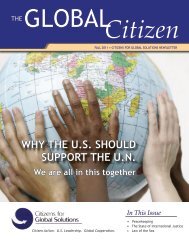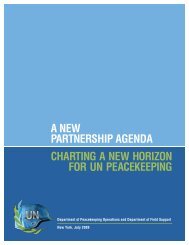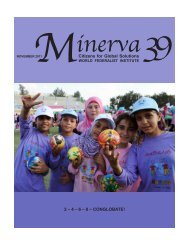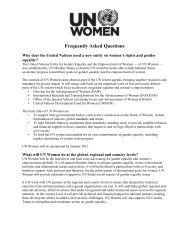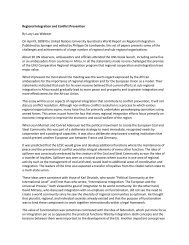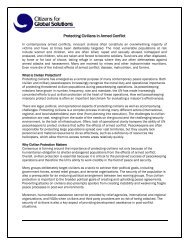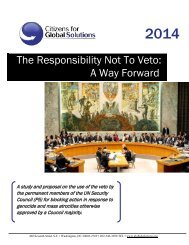Minerva, Spring 2008 (Volume 32) - Citizens for Global Solutions
Minerva, Spring 2008 (Volume 32) - Citizens for Global Solutions
Minerva, Spring 2008 (Volume 32) - Citizens for Global Solutions
Create successful ePaper yourself
Turn your PDF publications into a flip-book with our unique Google optimized e-Paper software.
For the poor, however, the major source<br />
of insecurity is their own poverty, and the<br />
social conditions that accompany poverty:<br />
ill-health, illiteracy, exclusion and<br />
inequality, including gender inequality. For<br />
example, World Bank research shows that<br />
poor women’s greatest fear is ill-health;<br />
and a health crisis is the cause most often<br />
cited by families who have fallen into<br />
destitution.<br />
As experience constantly reminds us –<br />
from the global HIV/AIDS epidemic to the<br />
hunger crisis … – individual insecurity on<br />
a large enough scale becomes a threat to<br />
national, regional and even global security.<br />
And extreme poverty is on a vast scale:<br />
over a billion people live on less than a<br />
euro a day. Three billion people, half the<br />
world’s population, live on less than two<br />
euros a day.<br />
All these issues, and many more, are<br />
well documented. They are the subject of<br />
endless discussion at all levels. There are<br />
solid international agreements on how to<br />
approach them. Yet somehow the political<br />
will to respond is lacking. Governments<br />
look first – and often only – at their narrow<br />
self-interest. The international response is<br />
accordingly weak and hesitant.<br />
To give only two examples of this failure<br />
of political will: first, world military<br />
expenditure in 2004 was over $1,000 billion,<br />
or 2.6 per cent of global GNP. One<br />
country was responsible <strong>for</strong> nearly half of<br />
that total. Second, in the same year, global<br />
expenditure on international development<br />
assistance from all countries was under<br />
$80 billion. These grossly disproportionate<br />
figures reflect the distorted realities we<br />
live with. The major underlying threats to<br />
security are social, while the overwhelming<br />
bulk of expenditure on security is<br />
military.<br />
Security as a Social Issue<br />
I would like to make three brief points.<br />
• First, human security is essential <strong>for</strong> security<br />
in the broader sense. Better health,<br />
education and moves to reduce gender inequality<br />
help to defeat poverty, exclusion,<br />
powerlessness and deprivation. This in turn<br />
reduces the sense of oppression and injustice,<br />
and denies extremism and conflict the<br />
conditions in which they flourish.<br />
• Second, guaranteeing human security<br />
does not require any new or unusual actions,<br />
nor any especially expensive inputs.<br />
There is a road map, in the <strong>for</strong>m of the<br />
Millennium Development Goals and other<br />
international instruments.<br />
• Finally, all nations must consider their<br />
response to the question of national<br />
security versus human security. The response<br />
includes new thinking on <strong>for</strong>ms of<br />
governance, economic relationships and<br />
international co-operation: it also supports<br />
the multilateral approach to consensusbuilding<br />
through the United Nations.<br />
Protecting national borders no longer guarantees<br />
security. Each nation has to arrive at<br />
a vision of community that includes all its<br />
people, the poor as well as the better-off;<br />
and all its neighbours, in whatever part of<br />
the world they may be. Security demands a<br />
new commitment to multilateralism, and to<br />
the value of the individual human being.<br />
To take these points in order:<br />
Deep and pervasive poverty is an ancient<br />
problem, and to a great extent all societies<br />
have accepted it as inevitable. The<br />
traditions of all cultures, including the<br />
prevailing liberal economic theory, call <strong>for</strong><br />
assistance to the poor; but liberal economics<br />
assumes, in common with all other traditions,<br />
that poverty and inequality are part<br />
of the normal social and economic order.<br />
The realities of the 21st century demand a<br />
closer look at this assumption.<br />
In the last third of the last century, the<br />
most successful developing economies in<br />
Asia and Latin America invested heavily<br />
in social programmes, including universal,<br />
free education <strong>for</strong> both sexes, and in health<br />
care, including reproductive health.<br />
A study by the Royal Institute <strong>for</strong> International<br />
Affairs in London confirms that there<br />
is a two-way relationship between economic<br />
growth and health: “Life expectancy<br />
and adult survival rates exercise a positive<br />
impact on human capital <strong>for</strong>mation and<br />
hence on economic growth. In turn, sustained<br />
growth rates allow <strong>for</strong> better health<br />
5 • <strong>Minerva</strong> #<strong>32</strong> • June <strong>2008</strong><br />
conditions.” In plain language, that means<br />
that healthy people make better workers,<br />
better workers make stronger economies,<br />
and stronger economies allow people to<br />
live better and make good choices.<br />
More specifically, the research of Nancy<br />
Birdsall and Steven Sinding has shown<br />
how better reproductive health, smaller<br />
families and slower population growth,<br />
together with universal education, were<br />
part of the reason <strong>for</strong> the explosive growth<br />
of the East Asian “tiger economies” in the<br />
1980s and 90s.<br />
Amartya Sen has shown how democratic<br />
institutions – and particularly the inclusion<br />
of women in the political process<br />
– contribute to more equitable development.<br />
Among other things, women tend<br />
to focus on the essentials of education<br />
and health care. Sri Lanka, Kerala and<br />
some other states in India, have provided<br />
examples of how to achieve high literacy,<br />
low maternal and child mortality, smaller<br />
families and broader life choices, even in<br />
a low-income setting. The most important<br />
factor was not ample resources so much<br />
as a perception that human security was<br />
of primary importance.<br />
That leads me to my second point: there<br />
is a clear and detailed road map to human<br />
security. The road leads through social investment,<br />
through ending extreme poverty,<br />
to equitable development.<br />
I was a member of the Secretary-General’s<br />
High-level Panel on Threats, Challenges<br />
and Change. After considerable research<br />
and discussion, we concluded that development<br />
is the indispensable foundation<br />
<strong>for</strong> a collective security system, first, to<br />
combat poverty, infectious disease and<br />
environmental degradation which threaten<br />
human security; second, to maintain states’<br />
capacity to meet threats to security; and<br />
finally, to address the environment in<br />
which terrorism and organised crime can<br />
flourish.<br />
The Panel recognised that there were<br />
many obstacles to the efficient delivery of<br />
resources <strong>for</strong> development, including fair<br />
treatment <strong>for</strong> poor countries in matters<br />
such as trade and debt relief. There is also<br />
an urgent need <strong>for</strong> better co-ordination



